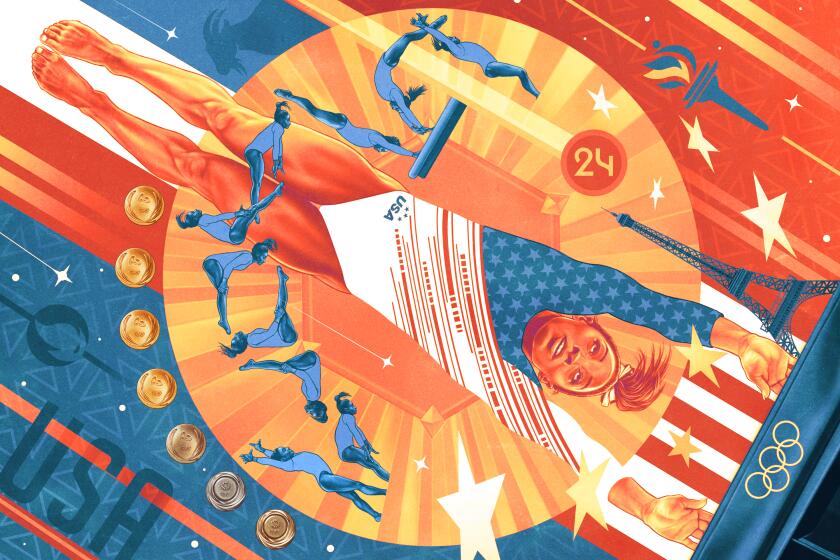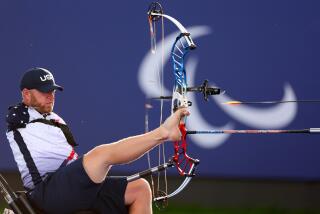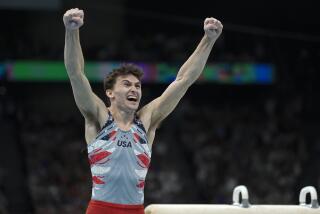
- Share via
PARIS — The guy lugging an overstuffed bag onto the New York subway, looking hurried, maybe a little tired, is a three-time Olympian.
Eli Dershwitz has been rushing around the city, training at one fencing club and coaching young students for money at another, followed by more training and coaching sessions at several more stops during his 10-hour day.
“So I’m just running around like crazy,” he says. “I’ve got three changes of clothing and … the bag gets heavier and heavier.”
It doesn’t matter that Dershwitz is the reigning world champion in men’s saber and a medal favorite at the 2024 Paris Games. It doesn’t matter that some of his opponents live in countries where the government covers all expenses.
The Yurchenko double pike has become Simone Biles’ signature move in the vault, a gravity-defying, six-second burst that has added to her legend.
Gymnast Simone Biles and sprinter Noah Lyles might be wealthy from their Olympic victories, but they are exceptions. Like many American athletes, Dershwitz cannot subsist on the stipends and bonuses he receives from USA Fencing and the U.S. Olympic & Paralympic Committee. He coaches five hours a day — on top of training — to pay the bills.
A recent congressional report finds that, on average, U.S. athletes must come up with nearly $12,000 a year to supplement their funding. “This means that, effectively, many of America’s most talented athletes must pay for the privilege of competing under our flag,” the report states.
“To be honest, it’s not easy,” Dershwitz says. “People don’t realize the situation we’re in.”

There was a time when Olympians weren’t allowed to receive any money, when the International Olympic Committee clung to a hidebound notion of amateurism. That began to change in the 1970s and ‘80s amid suspicions that the Soviet Union and other Eastern Bloc countries were secretly supporting their national teams.
As IOC rules evolved, governments began spending freely through their ministries of sport. The U.S. chose a different route, putting the onus on the USOPC and the national governing bodies for each sport to raise money through donations and corporate sponsorships.
“It goes to the fundamentals of what the Olympic Games mean to our country,” says Carrie Potter, a lecturer in sport finance at Rice University. “The way the United States approached it was to say let’s keep politics out of sports.”
The 28-year-old Dershwitz, who graduated from Harvard with a history degree in 2019, doesn’t have the opportunity to make millions by playing professionally or signing lucrative endorsements. His sport isn’t like basketball, tennis or golf.
“If my main goal in life was to, you know, just make bank,” he says, “[fencing] is probably the stupidest thing I could do.”
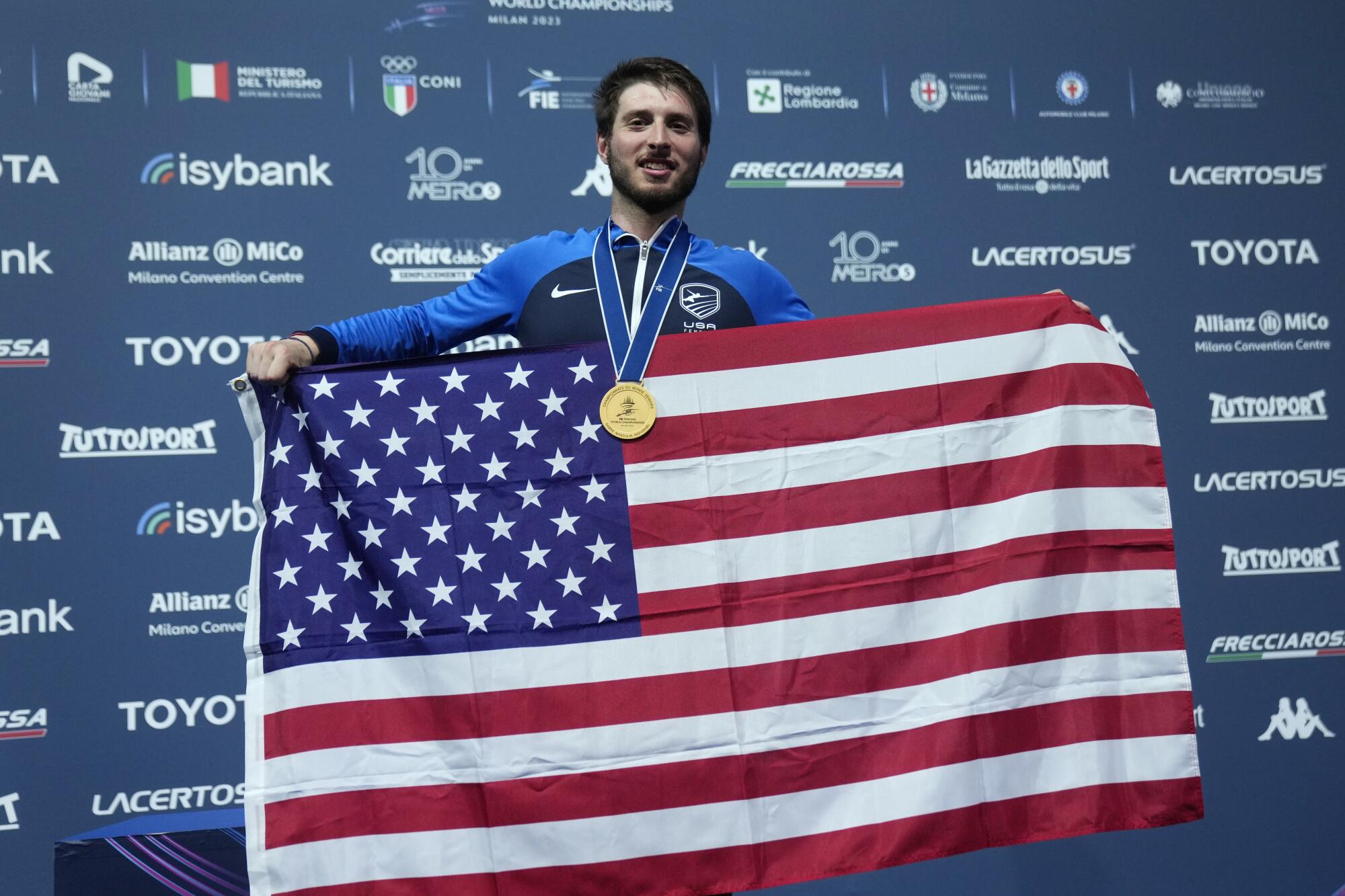
Not that he and his counterparts in, say, rowing and wrestling are downtrodden. As Congress noted in its 277-page “Passing the Torch” report, the USOPC distributes tens of millions in funding each year. Its “Operation Gold” pays bonuses for Olympic medals ranging from $15,000 to $37,500.
Other support includes tuition assistance, health insurance and a program that has helped more than 800 athletes get NIL deals worth an average of $3,000 a year. All of this puts the U.S. well ahead of poorer nations.
Still, only half of American athletes surveyed by Congress were receiving financial aid. There were stories of athletes living in their cars and subsisting on food stamps.
Some, like Dershwitz, work full- or part-time jobs while they train. Others turn to crowdfunding or rely on family and friends.
Legislators noted a “stark imbalance” in the millions devoted to executive salaries at the USOPC and governing bodies “while many of the high-performance athletes striving to win America glory at the Olympics and Paralympics are barely getting by.”
All of this leads to a common dilemma for Olympians when they hit their mid- to late 20s: Should they keep competing or walk away and get on with their lives?
Jess Bartley, who counsels athletes as the USOPC’s senior director of psychological services, says: “It’s really hard when they know they’re not going to make a ton of money.”

For Dershwitz, the moment of truth — athletically and financially — came at the Tokyo Olympics in 2021.
After waiting around an extra year for those COVID-delayed Games, he suffered an upset loss in the round of 16. Coupled with an early exit at the 2016 Rio de Janeiro Olympics, it left a bitter taste.
I can’t finish my career like that, he recalls thinking. I have worked so hard for so long.
The decision to stick around until Paris meant finding a way to support himself. Though a 9-to-5 job would leave early mornings open for conditioning and evenings for fencing, Dershwitz had seen other athletes struggle with that balance.
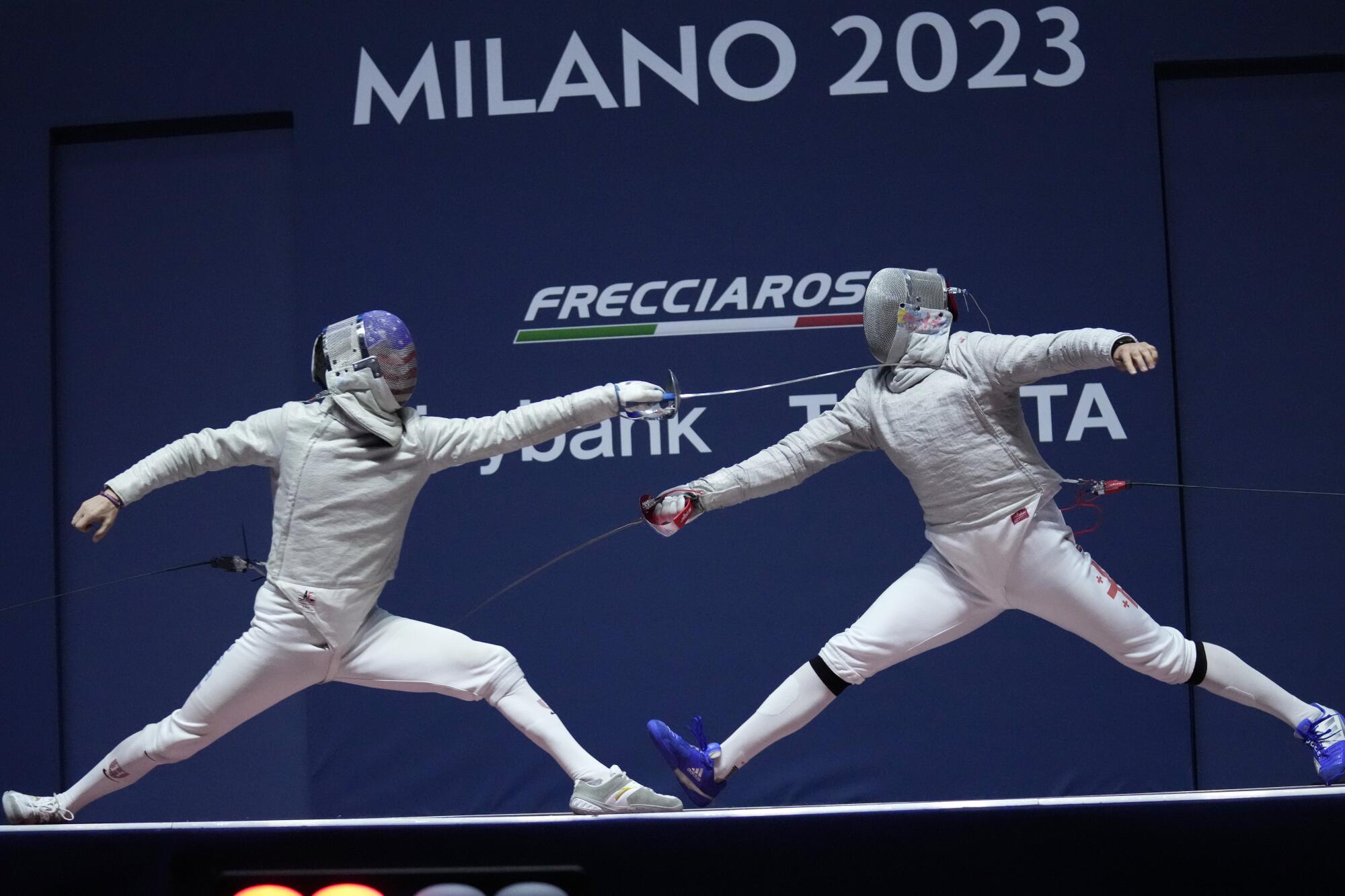
The Tim Morehouse Fencing Club — founded by an Olympic silver medalist — offered to let him coach part-time instead. The money paled in comparison to what some of his Harvard classmates were making in the real world, but his girlfriend worked in finance, so they could afford an apartment in Queens.
“She has been completely understanding,” he says. “I consider myself lucky.”
His days stretched to include a combination of training and coaching sessions at NYU in Greenwich Village, a club near Herald Square, Morehouse on the Upper West Side, the New York Athletic Club across from Central Park and back to Morehouse.
As the hours passed, his bag would get loaded down with protein drinks and snack bars. If Dershwitz fell behind on conditioning, he put his students through a core workout and did it with them.
Aleks Ochocki, a national team coach, saw the fencer occasionally struggle to keep up with this schedule.
“The things you put your body through,” Ochocki says. “It’s not fun at times.”

The American team is expected to win 123 medals in Paris, almost 40 more than the next-closest nation, according to predictions by Nielsen’s Gracenote.
Part of this is a numbers game. With a population of 335 million and an Olympic squad of 592, the U.S. draws from a large gene pool and has lots of opportunities to reach the podium.
But like other governing bodies, USA Fencing worries that national team members can’t afford to stay in the sport from Games to Games. They know that top rivals in the men’s saber event on Saturday — Aron Szilagyi of Hungary, Ziad Elsissy of Egypt, Sandro Bazadze of Georgia — are in their late 20s and 30s.
“It’s just the experience,” Ochocki says. “We’re seeing fencers become a little younger, but usually they’re at least 25 before they get the results.”
Dershwitz’s decision to keep competing has already paid off with that victory at last summer’s world championships. Falling six touches behind in a semifinal bout against Szilagyi, he changed strategy and stormed back for a 15-13 win. In the final, he dominated Bazadze by a score of 15-6.
“I’m a little bit more mature now,” he says. “I like my mental game.”
Next comes Paris and the chance to add the one thing missing from his resume — an Olympic medal. The thought of it has kept him going, carrying that bag, trudging onto the subway and working his part-time job. Like so many elite athletes in America, he has done whatever it takes.
More to Read
Go beyond the scoreboard
Get the latest on L.A.'s teams in the daily Sports Report newsletter.
You may occasionally receive promotional content from the Los Angeles Times.

